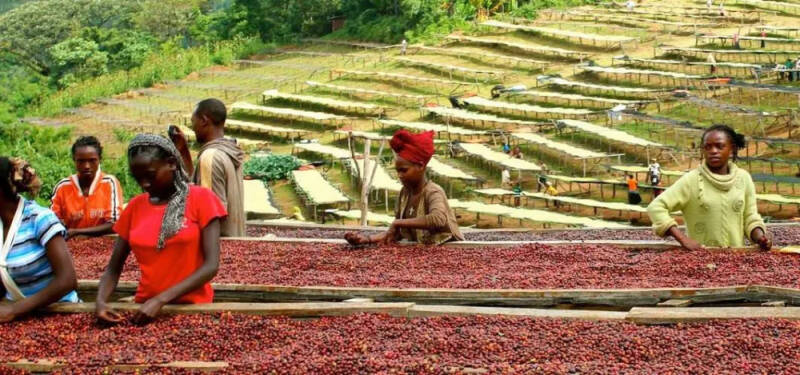Ethiopia has serious coffee transport problems due to conflict, and the government is considering turning to rail transport.
Recently, according to the Ethiopian journalists Network, civil strife has broken out in the Ethiopian government, the security situation is worrying, and there have been a number of kidnappings, robberies and even killings there, especially in the western and northern regions of Amhara and Oromiya in Ethiopia. The Ethiopian Government is currently considering rail transport and is considering joining the private sector.
In fact, a peace agreement has been reached in the country's civil war since 2022, but riots continue. However, since coffee exports increase income in foreign currencies (US dollars) and are used to buy weapons on the international market, Ethiopia's coffee production and exports have continued to grow since the outbreak of the Tigre War, but it has now affected imports and exports in terms of domestic transport.

Recently, there have been a number of reports of blackmail, violent attacks and even violent attacks on drivers, resulting in heavy casualties, property losses and serious economic impact. This situation has seriously affected the country's transport industry and operators of freight trucks and public transport services.
As a result of frequent armed attacks, the Ethiopian Association of heavy truck drivers has designated routes such as the Dongsheiwa area in the Oromi region as "danger areas". This situation poses a major threat to the Ethiopian economy. Ethiopia's main exports of agricultural products and imports, such as leather, gold and coffee beans, need to pass through the port of Djibouti, and the route in the East Sheva region is the only way for the port. Coffee exports account for 30% to 35% of Ethiopia's export earnings, and if this continues, it could exacerbate inflation and recession.

However, the Ethiopian Government has begun to consider rail transport in order to solve the freight problem, and officials of the Ministry of Transport and Logistics are considering allowing the private sector to participate in rail freight in order to reduce transport costs and market commodity prices. Earlier railways were used by fewer traders because of the long transport time.
At present, Ethiopia's railway infrastructure and operators are owned by the state, and the largest railway transport company, Ethiopia-Djibouti Standard gauge Railway Transport Company, is 75% owned by the Government of Ethiopia, while the Government of Djibouti has a minority stake. Recently, the Ministry of Railways has been conducting feasibility studies to explore the possibility of private sector participation in railway transport, and many coffee traders are interested in this. In addition, senior executives of the state-owned Ethiopian railway company believe that the production of private enterprises can minimize the impact of logistics and transport barriers on commodity prices, which can be as high as 45% of costs, according to a government report.
However, there are still many problems with the railway. The Ethiopia-Djibouti railway can carry 10 million tons of goods per year, but its transport volume is well below its potential, and it faces animal and human obstacles and safety problems. These problems slow the speed of the railway to 30 kilometers per hour. If private enterprises can invest, it will benefit the transport and logistics sectors and strengthen import and export logistics.
Important Notice :
前街咖啡 FrontStreet Coffee has moved to new addredd:
FrontStreet Coffee Address: 315,Donghua East Road,GuangZhou
Tel:020 38364473
- Prev

Guatemalan Coffee beans | introduction of Flower God Coffee beans in Raminita Manor in Antigua
In the coffee growing belt, and the American region happens to be in the coffee growing belt, there are many famous coffee growing countries in the Americas, such as Panama, Honduras, Costa Rica, Guatemala and so on. Guatemala was the number one coffee producer in Central America in the 20th century and the early 21st century.
- Next

No security measures! The "original" coffee stand in Hutiaoxia is a little dangerous.
▲ Click to follow | Daily boutique Coffee Culture Magazine Coffee Workshop carries a backpack and going out has become a pastime for young people in their spare time. Among them, Tiger leaping Gorge, known as "one of the ten classic hiking routes in the world", is the first choice for many thrill-seeking backpackers. Here you can see the surging Jinsha River and enjoy it.
Related
- What grade does Jamaica Blue Mountain No. 1 coffee belong to and how to drink it better? What is the highest grade of Blue Mountain coffee for coffee aristocrats?
- What are the flavor characteristics of the world-famous coffee Blue Mountain No. 1 Golden Mantelin? What are the characteristics of deep-roasted bitter coffee?
- Can I make coffee a second time in an Italian hand-brewed mocha pot? Why can't coffee be brewed several times like tea leaves?
- Hand-brewed coffee flows with a knife and a tornado. How to brew it? What is the proportion of grinding water and water temperature divided into?
- What is the difference between Indonesian Sumatra Mantinin coffee and gold Mantinin? How to distinguish between real and fake golden Mantelin coffee?
- What does bypass mean in coffee? Why can hand-brewed coffee and water make it better?
- Unexpected! Ruixing Telunsu lattes use a smoothie machine to foam milk?!
- % Arabia's first store in Henan opens into the village?! Netizen: Thought it was P's
- Does an authentic standard mocha coffee recipe use chocolate sauce or powder? Mocha Latte/Dirty Coffee/Salty Mocha Coffee Recipe Share!
- What is the difference between Vietnam egg coffee and Norway egg coffee? Hand-brewed single product coffee filter paper filter cloth filter flat solution!

